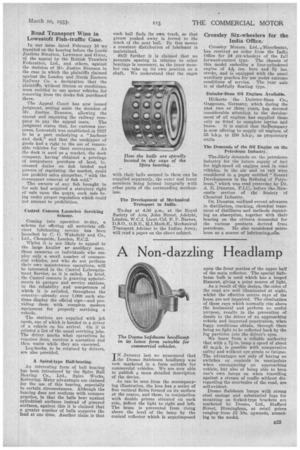Road Transport Wins in Lowestoft Fish-traffic Case.
Page 41

If you've noticed an error in this article please click here to report it so we can fix it.
In our issue dated February 10 we reported on the hearing before the Lords Justices Scrutton, Lawrence and Greer, of the appeal by the British Trawlers Federation, Ltd., and others, against the decision of Mr. Justice Branson in the case in which the plaintiffs claimed against the London and North Eastern Railway Co. a declaration that the Plaintiffs, without licence or conditions, were entitled to use motor vehicles for removing from the docks fish purchased there.
The Appeal Court has now issued judgment, .setting aside the decision of Mr. Justice Branson, allowing the appeal and requiring the railway com pany to pay the appeal costs. The judgment states that, for customs purposes, Lowestoft was established in 1827 to be a port embodying a "harbour and dock," and that the emshipper of goods had a right to the use of reasonable vehicles for their conveyance. As the dock is used as a market, the dock company, having obtained a privilege of compulsory purchase of land, increased duties on fish landed and powers of regulating the market, could not prohibit sales altogether, "with the consequent removal of fish sold."
The owners of any fish brought in for sale had acquired a statutory right lsale upon the quays, such sale being under proper regulation which could not amount to prohibition.
Castrol Concern Launches Servicing Scheme.
Coming into operation to-day, a feherne for offering all motorists efficient lubricating service has been launched by C. C. Wakefield and Co., Ltd., Cheapside, London, E.C.2.
Whilst it is not likely to appeal to the large haulier tor ancillary user, those concerns or individuals who employ only a small number of commercial vehicles, and who do not perform their own maintenance operations, will be interested in the Castrol Lubrequip'meet Service, as it is called. In brief, , the Castrol concern is granting appointments to garages and service stations, in the reliability and competence of which it is satisfied, throughout the country—already over 1,000 such stations display the official sign—and providing them with complete modern equipment for properly servicing a vehicle.
The stations are supplied with job cards, one of which is handed to a driver of a vehicle on his arrival. On it is printed a list of the usual servicing jobs. The driver marks what operations he requires done, receives a quotation and then waits while they are executed.
Log-hooks, to be retained by drivers, are also provided.
A Spiral-type Ball-bearing.
An interesting form of ball bearing has been introduced by the Spiro Ball Bearing Co., Ltd., Spiro Works, Kettering. Many advantages are claimed for the use of this bearing, especially in certain circumstances. Although the bearing does not conform with common practice, in that the balls bear against cylindrical surfaces instead of grooved surfaces, against this it is claimed that a greater number of balls supports the load at one time. Another claim is that each ball finds its own track, so that grease pushed away is forced to the track of the next ball. By this means a constant distribution of lubricant is maintained.
Still further it is claimed that no accurate spacing in relation to other bearings is necessary, as the inner member can take up its own position on a shaft. We understand that the cages with their balls secured in them can be supplied separately, the outer and inner members being formed integrally with other parts of the surrounding mechanism.
The Development of Mechanical Transport in India.
To-day at 4.26 p.m., at the Royal Society of Arts, John Street, Adelphi, London, W.C.2, Lieut.-Col. E. P. Barnes, D.S.O., 0.B.E., M.Liltlech.E., Mechanical Transport Adviser to the Indian Army, will read a paper on the above subject.
Crossley Six-wheelers for the India Office.'
Crossley Motors, Ltd., Manchester, has received an order from the India Office for 24 six-wheelers of the full forward-control type. The chassis of this model embodies a four-eylindered engine of 4/-66ins, bore and 5i ins. stroke, and is equipped with the usual auxiliary gearbox for use under extreme conditions of service. The rear axle is of thelfully floating type.
Daimler-Benz Oil Engines Available. Hitherto the Daimler-Benz Co., Gaggenau, Germany, which during the past two or three years, has devoted considerable attentias to the development of oil engines has supplied these only . as fitted to complete Joules and buses. It is stated that theecompany is now offering to supply oil engines, of 55 b.h.p. to 150 b.h.p., as proprietary units.
The Demands of the Oil Engine on the Petroleum Industry.
The .likely demands on the petroleum industry for the future supply of fuel for high-speed oil engines used in road vehicles, in the air and on rail were considered in a paper entitled " Recent Developments in the Refining of Petroleum," which was read yesterday by Dr. A. E. Dunstan, F.LC., before the Newcastle section of the Society . of Chemical Industry. .
Dr. Dunstan outlined recent advances in distillation, cracking, chemical treatment of distillates and methods depending on absorption, together with their bearing on the criteria demanded for the various products derived from
petroleum. He also considered petroleum as a source of lubricating-„oils.






































































































